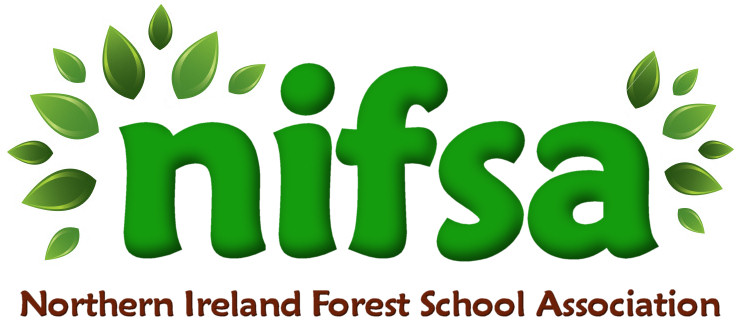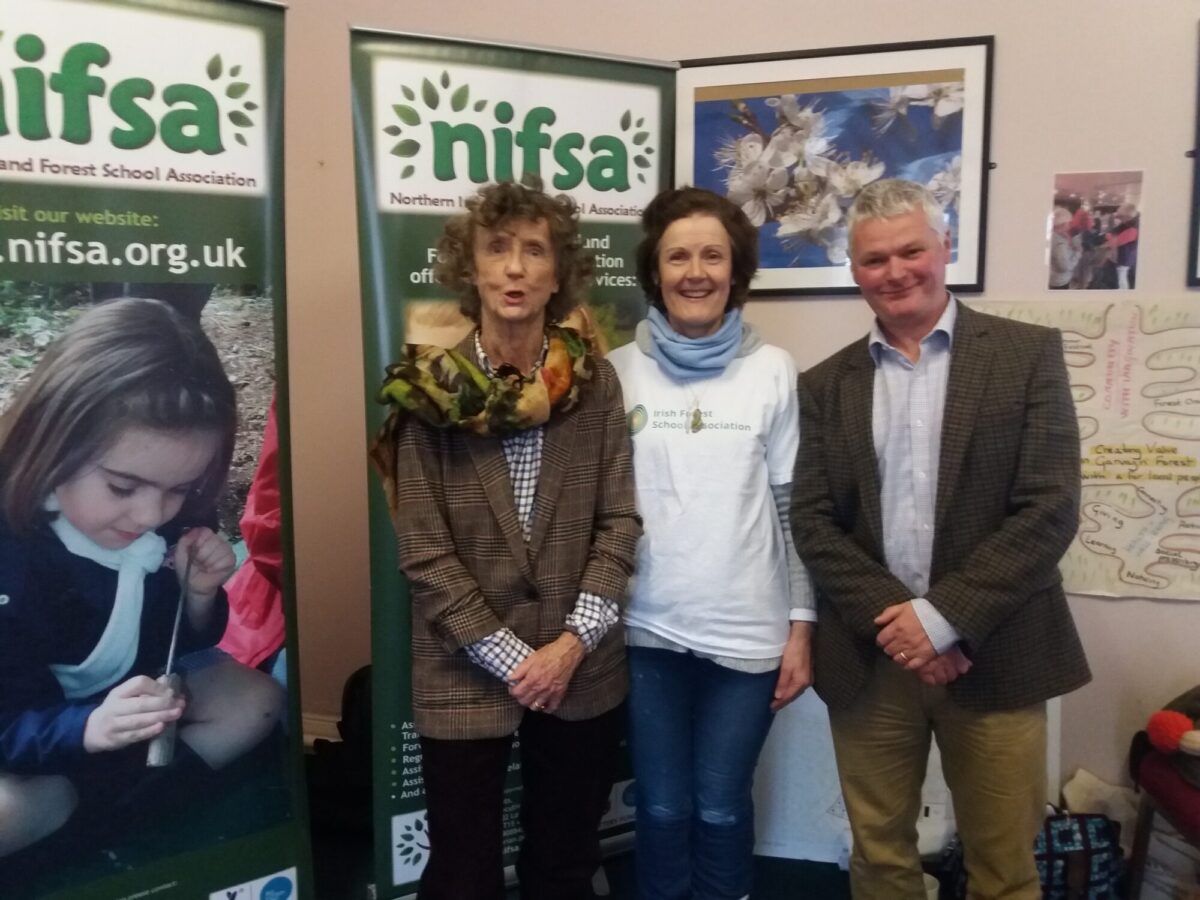Start your Forest School journey NOW!
NIFSA has been delivering Forest School training and accreditation to educational establishments since 2008.
NIFSA is the leading Forest School programme provider for schools, nurseries and Universities across Northern Ireland.
Scroll down to find out what a Forest School is, what the benefits are and importantly how to become a NIFSA Forest School.
NIFSA has secured funding from local Councils, Government and private companies to provide FREE Forest School training and accreditation to schools and nurseries. See below.
Applications are on a rolling basis, so you can apply at anytime. Please use this link to go the application form and details on how to apply. Forest School Awards - Northern Ireland wide application form • Forest Schools in Northern Ireland (forestschoolsni.com)
What is Forest School?
"Forest School" is based on a Scandinavian idea that considers children's contact with nature to be extremely important from an early age.
A study trip from Somerset to Denmark in 1995 decided that the approach was appropriate for use in Britain. Since then Forest School has spread to many areas as educationalists have witnessed the impact that it can have on children.
Teachers TV
Outdoor Learning with Forest School
Ted Talks
Forest Kindergarten
Forest School can develop early learning skills
Find a Forest School near you
Characteristics of Forest School
Safety
- The setting is rigorously checked before every session.
- Clear boundaries are established for the children to stay within.
Learning can be linked to the National Curriculum
- By incorporating innovative approaches to learning (such as undertaking small and easily achievable tasks) children are encouraged to develop their curiosity and motivation to learn. This is particularly important for those who find it difficult to assimilate knowledge in a strictly classroom situation.
Multisensory
- The freedom to explore using multiple senses is fundamental for encouraging creative, diverse and imaginative play.
- The focus is on the "whole child" (not just their academic ability).
Regular contact
- Regular contact for the children over a period of time (e.g. all year round, in all weathers).
Adult supervision
- A high adult to pupil ratio that allows for children to undertake tasks and play activities that challenge them but do not put them at undue risk of harm.
- It also allows practitioners quickly to get to know the individual learning styles, abilities and characteristics of the children in their charge.
Training
- Forest School sessions are led by qualified Forest School Leaders with a recognised Level 3 Forest School Award.
Risk Taking
- Children are encouraged to undertake an element of risk.
How To Become A Forest School
The Northern Ireland Forest School Association (NIFSA) has developed the only nationally recognsied Forest School qualification specifically for Northern Ireland.
NIFSA have trained hundreds of teachers to become accredited Forest School Level 3 Leaders in the process. There are now over 200 official NIFSA Forest Schools supporting over 5,000 pupils a month learning outside.
Step 1- Find out what is involved in becoming a NIFSA Forest School.
Browse through the flip book to see what is involved in becoming a NIFSA official Forest School.
It is important your school or nursery is fully committed to this process.
Help every step of the way
Hundreds of schools and nurseries are part of the NIFSA Forest School community. Here are some of the reasons why:
- Friendly and helpful staff to support you at every stage of your outdoor learning journey.
- Hundreds of outdoor activity ideas are available on the website.
- Website has the facility to record all your own outdoor learning sessions in one place.
- All the courses are completed and supported on-line.
- Facility to mentor other teachers in your school or nursery at cost price.
- Opportunity to get involved in other NIFSA programmes e.g. Nature Ranger Certification, Forest School Family, Forest School Manager Level 4 etc.
- Accreditation programme to encourage continued outdoor learning.
- Continuing Programme Development packages.
- And much more......
Step 2- Choose the NIFSA Forest School package that is right for you.
Browse through the flip book to see what package is right for your organisation.
FREE Forest School Training
Applications are on a rolling basis, so you can apply at anytime.
NIFSA has secured funding for approximately 60 FREE Forest School Awards Premium Packages available for schools, nurseries and preschools across Northern Ireland.
Not available for already qualified Forest Schools or private businesses.
This is a competitive process and submitted applications are not guaranteed of success. NIFSA want to ensure an equal number of organisations getting trained in every Council area therefore it is not a first come first serve process.
Each funder has specific conditions attached to the application. Some may only accept applications at certain times of the year etc. Once an application has been submitted, NIFSA will notify you of any specific criteria.
Applications are carried over to subsequent years. So if you have not been successful this year you will be automatically considered in following years.
Download the application form using the link below:-
Forest School Awards Northern Ireland Wide Application Form
When you have completed your application form please upload it in this section below:-
Forest School Awards Northern Ireland Wide Application Form
Thank you to Mid-Ulster District Council, Fermanagh and Omagh District Council, Antrim and Newtownabbey Borough Council, Lisburn and Castlereagh City Council, Belfast City Council, Ards and North Down Borough Council, Mid and East Antrim Borough Council, Northern Ireland Environment Agency and the Drumlin Wind Co-Operative for their continued support.
Still need help?
Contact Caoimhe Suitor, Forest School Development Manager on mdnaturerangers@gmail.com
Benefits of Forest School
The benefits of Forest Schools for children and society are well documented.
- Increased confidence and independence of the child.
- Development of their language skills by providing a real context for language.
- Ability to take risks and to become more open to new experiences.
- The forest school program evolves from the needs of the child and includes the child's interests.
- Provides the practitioner with an alternative view of the child and further insights into a child's development.
- Beneficial to a child's all-round development, particularly in the areas of personal, social and emotional, language and communication.
- Underpins the principles laid down in the foundation stage guidelines.
- The forest school experience has been very well received by all those involved in it.
- Provides opportunities for the children to take risks, problem solve and use thinking skills.
- Complements learning in the classroom and can be transferred.
- Click on the image opposite for more benefits.


The Northern Ireland Forest School Association
The Northern Ireland Forest School Association (NIFSA) has been developing Forest School programmes in Northern Ireland since 2008. NIFSA is a registered charity and is a company limited by guarantee. NIFSA is recognised as the foremost authority on Forest Schools in Northern Ireland and is hugely respected internationally.
Since 2008 NIFSA has developed its own Government recognised Forest School Leader qualification. This ensures that training and accreditation are to the very highest standard. Teachers that attain the qualification are confident and competent at delivering top quality environmental education programmes with their pupils and train other teachers within their school to become involved.
NIFSA is working with hundreds of schools and nurseries throughout Northern Ireland through a variety of different programmes.
Every year NIFSA trains and accredits dozens of teachers and youth leaders to achieve their Forest School Leader Level 3 qualification. NIFSA engages tens of thousands of children in outdoor learning annually.
NIFSA is a membership organisation and also secures its finances through service contracts with local authorities and central Government in Northern Ireland. Finally, local businesses also support NIFSA to work with local schools.
Dr Gillian Humes, former Science Co-Ordinator Belfast Education & Library Board said this about the work of NIFSA:
"This is one of the few projects that truly integrates all elements of the revised curriculum.
It incorporates aspects of history, geography and science, delivers an opportunity to develop thinking skills and personal capabilities, and has a strong emphasis on promoting numeracy and literacy. Even more importantly than this, the initiative connects children to their outdoor environment, stimulating curiosity and inspiring a love of the natural world that is likely to remain long after the end of primary school."
Learning without Walls
Getting children learning outside in the natural environment with their schools, youth groups and families.
The Learning Without Walls initiative is the vision of the late Lady Dufferin and the collaboration of the Dufferin Foundation and the Northern Ireland Forest School Association (NIFSA).
Children are suffering from nature deficit disorder, a term used by Michael Louv in his book "Last Child in the Woods". Evidence is showing that children are suffering from serious mental and physical health issues because they are not spending time outside.
The Learning Without Walls initiative embraces all of the programmes run by NIFSA. They have all been designed to get children learning outside in the natural environment with their schools, youth groups and families.
About The Dufferin Foundation
Lady Dufferin was patron of the Northern Ireland Forest School Association from 2016 until her untimely death in 2020
She owned Clandeboye Estate which nestles in 2,000 acres of land in North Down. It has a working dairy farm and Yoghurt Company. There are over 1,000 acres of broadleaved woodland, making it one of the largest native woodlands in Ireland.
Lady Dufferin was always passionate about education, the environment and the arts and had been a huge supporter of them all over the years. She supported all of these worthy causes through her charitable Trust - The Dufferin Foundation.

Lady Dufferin was also instrumental in getting the Woodland Trust to operate in Northern Ireland. Now the Woodland Trust have over 53 publically accessible native woodlands covering over 1,000 acres.
Lady Dufferin's vision was to see Clandeboye Estate being used as a vibrant and inspirational centre of excellence for learning. Children, students, teachers, academics will be able to use Clandeboye Estate to become inspired and reconnected again to our natural world. Particular emphasis was also placed on Shared Education. Communities from different backgrounds learn and play together at Clandeboye. This experience breaks down any preconceptions or prejudices children may have of others from different cultural backgrounds and help forge a more tolerant and respectful society in Northern Ireland.
All of this activity comes under the umbrella of the "Learning Without Walls" initiative.
The Trustees of The Dufferin Foundation continue to support the legacy of Lady Dufferin.

